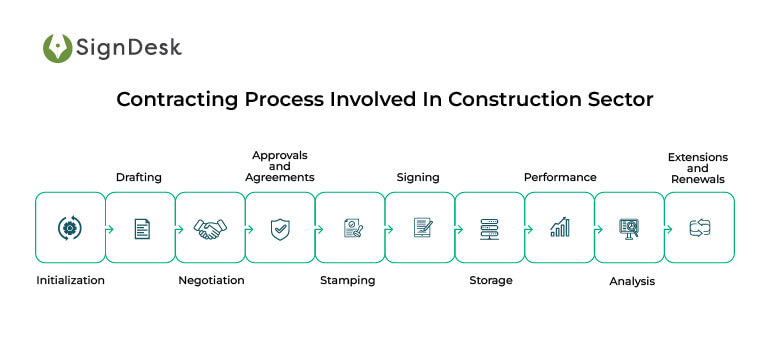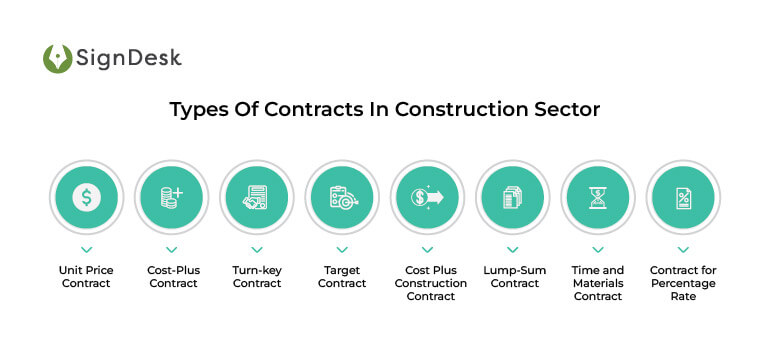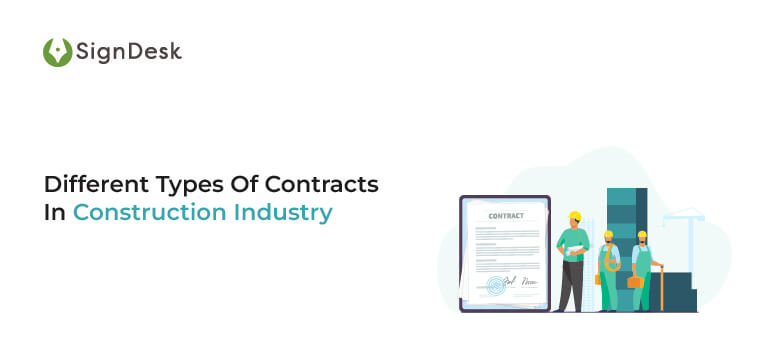What is a Contract?
A written or verbal agreement between two or more parties that establishes a legal obligation is referred to as a contract. A contract’s terms are legally binding and have specific consequences and remedies in the event that they are broken. Failure to perform any portion of the contract without a valid justification constitutes a breach of the contract. There exist different types of contracts in construction, legal, medical, insurance, banking, and other sectors.
An offeror makes an offer to enter into a contract with an offeree in every contract. The offeror makes an offer to do something specific (or refrain from doing something specific), and if the offeree accepts, a contract is formed. As can be seen, both the offer and the acceptance must satisfy certain requirements.
The Indian Contract Act, 1872, which is the main statute governing Indian contract law, lays forth the rules pertaining to contracts in that country. The tenets of English Common Law serve as the foundation for the Act. It is applicable to all of India’s states. It establishes the conditions under which commitments made by contracting parties shall be held to be legally binding. An agreement that is legally enforceable is what the Indian Contract Act defines as a contract under Section 2(h).
The criteria to be fulfilled for any contract to be enforceable are as follows.
- Offer: The parties must both demonstrate their capabilities to perform the obligations mentioned in the contract
- Acceptance: The terms of the contract & the offer made must be clearly accepted by both parties
- Awareness: The parties must be aware of the basic content of the contract and consent to these terms
- Consideration: A promise of something valuable must be made in return for performing the actions outlined in the contract, these could be goods or services delivered
- Capacity: All the parties to the contract must demonstrate the legal capacity to consent to the contract
- Legality: Finally, the terms of the contract must be in compliance with the laws of the jurisdiction under which it’s supposed to be carried out
Additionally, an official contract between a person or company acting as the contractor and another acting as the client is known as a contract for general contractors. In a general contractor contract, the contractor signs a contract promising to carry out certain tasks or render specific services in accordance with certain conditions.
What is a Construction Contract?
A construction contract is a legally binding document that governs the construction of buildings or properties on a piece of real estate.
The conditions of a building project are outlined in a construction contract agreement. All parties involved must agree to the legal agreement that details the work being done.
The majority of construction firms or contractors use a template as the foundation for their construction contracts. Their regular operating methods, fees, and other terms are described in this template.
Each agreement will vary slightly depending on the project, with adjustments made for cost, the scope of work, and other factors. To safeguard parties on both sides of the agreement, certain provisions should often be included in contract agreements for which there exist various types of contracts in the construction business.
Why Contracts are Crucial in the Construction Sector
Construction contract management is essential for all parties involved in a building project. But sometimes, these agreements are seen as purely as business transactions and their significance is overlooked.
It’s crucial for construction businesses to understand that their success as contractors is dependent on managing these building contracts the right way.
One of the many helpful services the construction management team provides is its expertise in using contracts to manage building projects. Since contracts are notoriously challenging to read and understand, lawyers earn a living by helping businesses with them.
Construction contracts are essential to the sector due to a variety of reasons –
-
Formalized Obligations
A contract is a formal record that summarises the agreements reached during negotiations between the parties to a project. Rules and obligations are established, and risk is defined. This allows construction companies to formalize their activities and create a plan of action to achieve their objectives. Additionally, with all construction obligations clearly laid out in a contract, businesses have something to fall back on in case of conflict.
-
Performance Tracking
By entering into a contract for commercial construction transactions, both parties can check if the obligations in the construction contract are being met. Construction contract management software offers features to track the performance of contracts to ensure that both parties are keeping their end of the deal.
-
Clear Negotiations
The process of contract negotiations is crucial in construction contracting. When engaged in negotiations, both parties can clarify what they expect from the other and ensure that future construction agreements are fair and equitable to everyone involved.
This helps both parties to be on the same page during the construction process and allows for activities to be carried out unencumbered.
-
Business Insights
When contractual obligations are specified in written form, the process of tracking the construction activities outlined and gaining insights from these becomes much easier for businesses.
Contract management software allows construction companies to leverage AI-powered contract algorithms to analyze construction contract performance. This analysis reveals decision-making insights to contractors enabling them to make smarter decisions.
Therefore, construction contract management is crucial for businesses to get the most out of their construction contract agreements.
There isn’t a distinct Construction Act in India despite there being so many types of contracts in the construction industry. The Indian Contract Act, 1872, which also governs other contracts, is the law that applies to building contracts.
For a contract made in accordance with the Indian Contract Act of 1872 to be deemed valid, it must be in compliance with all current laws, rules, and regulations.
The Contracting Process Involved in Construction Sector
The process of construction agreements goes through certain stages to reach completion. Let’s have a look at the different stages of construction contracts:

-
- Initialization – Known as the first stage of contract management, this phase entails a discussion of the specifics of the agreement that will be written, signed, and kept track of.
- Drafting – After obtaining the contract’s specifics, the parties concerned begin drafting the contract’s skeleton using the information they collected during the initiating step & by leveraging extensive clause libraries.
- Negotiation – Smart contracts are negotiated in real-time through extensive contact and engagement, which typically center on the parties’ key pieces of information.
- Approvals and Agreements – The parties settle on the parameters and each other’s terms and conditions in order to move forward with the contract, this step is completed using smart approval matrices that streamline the approval process.
- Stamping – For a smooth transition of contracts, construction CLM software also offers capabilities for eStamping.
- Signing – The parties eventually sign the construction contract using eSignatures or digital signatures to demonstrate their consent.
- Storage – Once executed, construction contracts are tagged and stored in a centralized contract repository
-
- Performance – In order to prevent late payments, litigation, and further obstruction of the process, parties agree to and follow the additional requirements as well as the previously mentioned rules, guidelines, and practices.
- Analysis – Smart CLM software offers contractors the means to analyze the performance of the contract and to what extent contractual obligations are met. This helps businesses learn from their construction contracts and make better decisions.
- Extensions and Renewals – If a contract expires, the parties can access the repository, review the contract’s specifics, and either renew or extend the agreement depending on their needs.
Types of Contracts in the Construction Sector
The construction business has seen different types of contracts involving many different parties. It’s important to get these contracts right since they specify the procedures and responsibilities of both parties and ensure that all legal and financial obligations are followed during the construction process. The types of contracts in civil engineering or construction have hugely contributed to the development of buildings both residential and commercial.
The various types of contracts in the construction sector are:

-
Unit Price Contract:
The terms item rate contract, value contract, measurement contract, and schedule rate contract are all variations of “unit price contract.” Under this type of construction contract management, contractors are required to produce rate estimates for specific items of work based on a schedule of quantities supplied by the owner.
-
Cost-Plus Contract:
Contractors are reimbursed for all costs associated with the construction process under a cost-plus agreement. The expenses may consist of direct expenses like labor, materials, supplies, etc. Additionally, they cover overhead expenses like insurance, mileage, and a portion of office rent. Furthermore, contractors receive a predetermined sum for the profit.
-
Turn-key Contract:
An agreement and contract between two parties wherein a project is delivered in its completed form is known as a turnkey contract. This is an alternate arrangement to making a staged project development agreement with an owner. Without the owner’s input, the developer is engaged to complete the full project. The project is only turned over once it is fully functioning, and the builder or developer is distinct from the eventual owner or operator. The developer is essentially “turning the key” over to the new owner after completing the project.
-
Target Contract:
This is a contract in which the contractor is compensated on the basis of a cost-plus-percentage of the work completed under the contract. Additionally, he or she receives a percentage plus or minus on any savings or surplus that are made in comparison to either a previously agreed-upon estimate of the overall cost or a target value that is determined by measuring the work once it is finished and valuing it at previously agreed-upon rates.
-
Cost Plus Construction Contract:
The contractor is compensated on the basis of the project’s real cost, including all direct and indirect expenses, plus a set fee. This fee could be a flat rate or a proportion of the expenses.
When the project scope is unclear in the early going, this kind of contract is perfect. Before the design phase is complete, the contractor can begin the project’s implementation. Before the building is finished, a cost estimate for the project is impossible.
-
Lump-Sum Contract
In a lump-sum deal, the contractor completes the project for a predetermined fee. Rather than placing a bid on the deliverables, the contractor will provide a final cost for the project. The contract is fairly straightforward and effective for projects with well-specified scopes.
These arrangements also simplify the selection process and business analysis. They enable the contractor to concentrate on quality, resources, and production.
-
Time and Materials Contract
One of the most important types of contracts in construction is a time and materials (T&M) contract, where the owner pays a predetermined sum based on the length of the project, the cost of the materials, and the percentage of profit that is built in. This contract is quite similar to a lump sum contract.
When a project is ambiguous or open-ended and a precise estimate of the time and materials required cannot be calculated, a time and materials contract is employed. A fixed-price agreement is not desirable in this situation since real expenses may greatly exceed the terms of the contract.
-
Contract for Percentage Rate
In this type of contract, the owner creates a schedule of products with quantities, rate units, and the amount specified. The percentages provided by contractors must be greater, less than, or equal to the rates listed in the schedule. The proportion provided by the contractor is applicable to the entire schedule.
Percentage rate contracts are employed when the owner does not want the contractor’s side of the tender to be imbalanced and also wants the contractor to complete the work in accordance with the description of the items with the quantity, rate, amount, and total amount.
Among the types of construction contracts mentioned above, the unit price, lump sum, fixed price, time and materials, and cost-plus contracts fall under the category of commercial contracts.
An agreement between contractors and business owners is referred to as a commercial construction contract. Non-residential structures like hotels, restaurants, entertainment venues, educational institutions, and many more are constructed under commercial construction contracts.
Contract Lifecycle Management To Automate Construction Contracts
To get over the tedious process of construction contracting methods, organisations are now using automated contract workflows that support intelligent processes and virtual contract collaboration. Best practices for contract lifecycle management are always evolving, with innovations at their heart to deal with the various types of contracts in construction that exist.
The lifecycle of a contract refers to its path from its original formulation to its final execution process. Contract lifecycle management is the process of monitoring and enhancing the lifecycles of contracts.
With the aid of contract lifecycle management, an organisation is able to keep track of and manage each stage that a construction contract goes through.
A “life cycle” is a model used in the context of contracts that help to understand and classify a contract’s many stages. The contract lifecycle journey begins when a request for a contract is made and includes all significant stages of a contract, including execution, tracking, intelligence, and renewal.
The three phases of contract development—pre-award, award, and post-award—can be separated into several categories when discussing contracts in the construction industry.
Pre-Award Phase
In this case, the pre-award, or bidding, the process is the most significant. The initial stage of contract management is called pre-award, and it varies depending on whether the company is the buyer or the seller in a negotiation.
The parties typically work hard to improve customer interactions and marketing strategy at the beginning of this phase. Smart CLM speeds up this stage by providing critical contract insights to decision-makers after examining past contract performance.
Award Phase
In this phase of contract negotiation, the buyer will have a variety of bids to choose from. This phase could be extremely simple, in which case the transition to negotiating and signing contracts will be fairly swift. The length of this phase will depend on the quantity of responses, the complexity of the needs, and the contract.
This second of three phases of contract management can be drawn out and complicated for companies operating in more complicated industries, such as defence or finance, or for those who are contracting across state or national borders.
Contract signing is not always an easy process, especially when dealing with big, global corporations. The appropriate signatories for the deal size must be identified by the legal and compliance teams on both sides of the contract, and they must oversee obtaining those signatures in a prompt and effective manner. Contract management software can be helpful in this situation by highlighting the appropriate stakeholder and providing contact information.
Post-Award Phase
After contracts are traded and signed, performance monitoring begins as the third and final phase of contract management.
A contract must be continually assessed for risk and performance; once signed, compliance’s participation in contract management does not end. The compliance team is responsible for making sure that the terms and conditions of the contract are followed, that both parties are aware of their responsibilities and are in constant communication, and that the contract is being performed to the desired standard.
This is where contract management must be kept on the straight and narrow; changes must be strictly documented and version control is of paramount importance. Having a central repository for all contract documentation can help ensure the change management process is as painless as possible.
CONTR.ACT: SignDesk’s Solution for Contract and Management
CONTR.ACT, an end-to-end CLM solution from SignDesk, allows you to create contracts and negotiate clauses in real time. For quick and safe contract execution, CONTR.ACT also provides basic eSignature and eStamping integrations. The SignDesk CLM product speeds up turnaround times, facilitates smooth operations for the different types of contracts in construction and entertainment industry contracts, and aids in managing large numbers of contracts within the contract repository. For our clients, automation has led to significant cost savings across a variety of contracts.
By integrating smart contract lifecycle management into their documentation workflows, businesses may completely change the way they handle their contracts, thereby reducing the risk of breach of contract. Companies can book a free demo to learn more about contracts, how to use SignDesk to streamline their contract procedures, and what constitutes a contract.
For a free demo and more information on our contract lifecycle management, get in touch with one of our solution consultants right away!
Get a free trial now!
